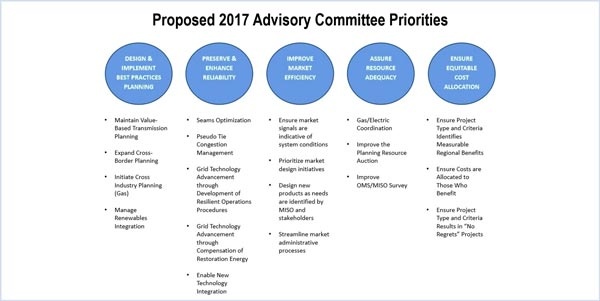MISO is requesting a 4% increase in operating expenses for 2017 while moving away from a one-year forecast in favor of a five-year business plan.
The requested increase will bring the 2017 operating budget to $289.6 million, said Mitch Myhre, chair of the MISO Finance Subcommittee, who presented the budget to the Advisory Committee during an Oct. 26 conference call.
The operating budget includes:
- $229.6 million in “base” spending;
- $51 million in structural expenses (including amortization of membership integration costs, depreciation of cybersecurity investments and infrastructure upgrades and funding of the Independent Market Monitor and Organization of MISO States); and
- $9 million for strategic initiatives, including the Competitive Retail Solution, seasonal and locational capacity, improving gas modeling, and automatic generation control enhancements.
MISO forecasts it will end 2016 with operating expenses of $225 million — its budgeted amount — to $227.3 million, which would be 1% over budget.
Myhre said MISO’s new five-year budget approach will be an “evolving, rolling” budget. The RTO is predicting a 1.9% compound annual growth rate for the next five years. The subcommittee and MISO staff are still working on the details of the five-year plan, Myhre added.
The plan projects an identical $289.6 million spend in 2018. In 2019, the figure increases to $293.5 million, then $299.5 million in 2020 and $306.7 million in 2021. In every budgeted year, MISO plans to spend exactly as much as it brings in.
MISO also is requesting a 2017 capital budget of $29.9 million — a drop from 2016’s $31 million — and an average capital spend of $32.9 million over the next five years.
However, the RTO said it might request out-of-cycle budget approvals in 2017 for initiatives in the works, including the construction of a new security operations center, more software quality control, improved server utilization, positioning an off-duty police officer at MISO control sites and insourcing some outside contracts. For those possible expenses, the Finance Subcommittee recommended MISO create business cases to present to the appropriate stakeholder groups.
American Electric Power’s Kent Feliks thanked Myhre and MISO for the budget work. “A lot of this work isn’t very exciting, but it’s vital to MISO,” he said.
Final approval of the 2017 budget and adoption of the five-year spending plan will take place at the Board of Directors meeting in December.
AC to Approve One of Two Sets of 2017 Priorities
The Advisory Committee will adopt one of two revised sets of priorities for 2017, choosing between one that is a slight revision of existing priorities and another that takes its cues from subcommittee mission statements.
Gary Mathis, representing MISO’s Transmission-Dependent Utility sector, said the committee’s approved priorities for this year are unclear and hard to remember. Mathis said the subcommittees’ mission statements could become the committee’s overarching priorities themselves. He presented five proposed priorities: implementing best planning practices; preserving and enhancing reliability; improving market efficiency; ensuring resource adequacy; and ensuring equitable cost allocation.
Advisory Committee Chair Audrey Penner presented the alternative, which was slightly changed from the 2016 priorities list. It moves the gas-electric coordination priority under a broader environmental policy and portfolio evolution priority. A strategic guidance priority was added in its place that includes hot topic discussions and a broad current issues subcategory. (See “Committee Endorses 5 Final Priorities,” MISO Advisory Committee Briefs.)
Penner said both priority documents capture “the essence of what the priorities should be.”
The committee will vote to adopt one of the two approaches at its December meeting. Penner said committee leadership hopes to keep the committee’s priorities on the books for multiple years while performing six-month “check-ins” to assess their continued relevance.
AC’s Strategic Session Prompts Possible ‘Hot Topic’ Change
Advisory Committee members noticed that the committee spent quite a bit of time on this year’s stakeholder redesign and said it looked forward to paying more attention to other issues in 2017, reported Penner, who gave an overview on the committee’s strategic planning session held at the end of September in San Antonio.
Penner also said the committee is looking to change its hot topic forum back to its original format, with wider stakeholder participation in drafting questions, instead of MISO facilitating the discussion. Director of External Affairs Kari Bennett said the RTO had no problem with re-establishing the old arrangement.
The Advisory Committee is considering holding hot topic conversations in 2017 that focus on transmission, including cost allocation, pseudo-ties and the competitive bidding process. Penner said the committee would solicit votes by email to its voting sectors to decide on a March topic. She added that the committee might suggest MISO hold an educational session prior to sectors submitting their written positions on hot topic subjects.
Penner also urged stakeholders to attend a Nov. 3 Stakeholder Governance Guide workshop. During the Oct. 26 Steering Committee conference call, Chair Tia Elliott said agenda items could include conference call logistics; meeting procedure education; an overview on Robert’s Rules of Order; criteria for establishing closed groups; and the creation of a definition for task teams with a process for creating and retiring them.
— Amanda Durish Cook





